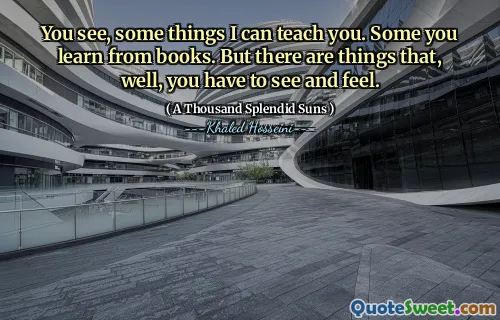
You see, some things I can teach you. Some you learn from books. But there are things that, well, you have to see and feel.
This quote highlights the profound difference between theoretical knowledge and experiential understanding. While books can provide vast amounts of information, insights, and frameworks for understanding the world, they often fall short in conveying the depth of human experience that must be felt firsthand. Certain lessons—like love, compassion, fear, or joy—are best grasped through personal encounters rather than academic study. For example, reading about compassion can inform us, but truly understanding it often requires practicing kindness and empathy in real-life situations.
Moreover, this quote emphasizes the importance of intuition and emotional intelligence. Some truths are revealed not through words but through lived moments—glances, touch, silence, or shared experiences. These can forge connections and insights that no textbook can teach. It encourages us to be present and open, to immerse ourselves in the visceral aspects of life's lessons rather than solely relying on conceptual understanding. It also subtly suggests that genuine learning often involves vulnerability—being willing to see and feel deeply can be as essential as acquiring knowledge.
In the broader scope of personal growth, this approach advocates for experiential learning as a vital counterpart to formal education. Life itself becomes a teacher when we are attuned to its subtleties, and sometimes, feeling is the key to truly understanding the world and our place within it.








